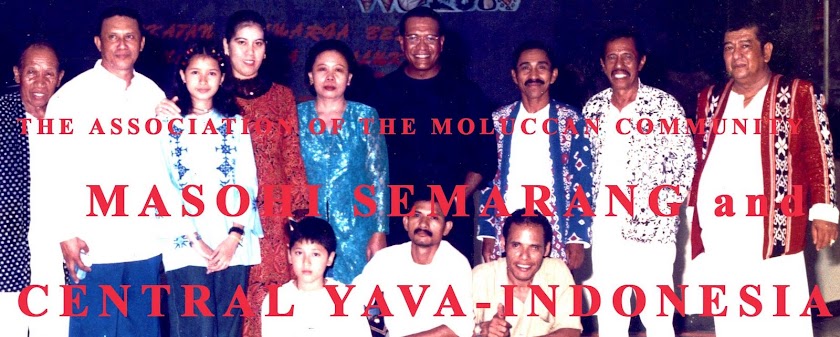ISLAM IN MALUKU
Islam came to Maluku in the 13th Century, after Gapi Baguna (reigned 1432 - 1465), the ruler of Ternate island, invited Muslim people (mostly merchants and traders from the Arabian Peninsula, Persia, China, Java and Sumatra) to live in his island. Baguna was very interested in their way of lives and wanted to learn more about them.
The arrival of those Muslims in Ternate brought the people of that island to the dawn of civilization. A beautiful Qur'anic recitation by a Javanese Muslim (one of the settlers) had left the ruler of Ternate and his entire palace highly impressed. When Gapi Baguna and the palace of Ternate adopted Islam and announced it to the people of Ternate, it marked the beginning of Islamization of the whole of Maluku.
Waves of immigration of Muslims from the above-mentioned countries also marked the beginning of racial mixing in Maluku. Soon, all the people of Ternate became Muslim. The tiny island of Ternate rose as a new power in Maluku and the eastern part of the Archipelago.
Also, their neighboring kingdoms in South and South-East Sulawesi (Celebes) embraced Islam and rose as prominent powers. These kingdoms from the three regions (South Sulawesi, Southeast Sulawesi and Maluku), soon formed a treaty. The treaty stabilized the social and political situation in the region, so more and more people were attracted to come to Maluku from various parts of the world. This contributed to further ethnic diversity in Maluku, with one thing in common, Islam.
CHRISTIANS IN MALUKU
In 1512, Ternate had become a Sultanate that controlled most of the western part of Maluku islands. Ternate's neighbor, Tidore island also became a great Sultanate that controlled most of the eastern part of Maluku islands including the western coast of Papua island (present Irian Jaya province of Indonesia and Papua New Guinea). Ternate and Tidore with their allies from Sulawesi also launched frequent expeditions to North Australia in search of eucalyptus and sea cucumbers.
In 1512, the Portuguese armada, led by Antonio d'Abreu anchored near the Lonthor Island, of the Banda group of islands, one of Maluku's many islands. A Malay merchant, Ismail, who was hired or captured by the Portuguese, helped D’Abreu. Soon, they reached another island, Neira, which was located only one mile away from Lonthor.
The Portuguese found high quality nutmegs on these islands. One of the Portuguese ships captained by Francisco Serrao was hit by a storm on its way home and was then stranded on an empty island, 150 miles from Banda. Local fishermen who then led them to another island, Ambon, where an important Muslim village, Hitu was located helped Serrao and his men.
Hitu was the center of Islamization in Central Maluku. The discovery of Hitu uncovered the other treasure of Maluku to the Portuguese, cloves. Cloves were the major crops of all the Sultanates in Maluku.
The Portuguese then sailed back to Goa, India, carrying back news about the Spice Islands. Alfonso d'Albuquerque immediately arranged large expeditions to secure these treasures in favor of the Portuguese crown. This was the beginning of the 93 years of Portuguese domination in Maluku, and also the beginning of never-ending trouble in Maluku. Competition to dominate spice trading among European powers, local resistance to the domination, and clash resulted from the spread of Christianity into the sultanates.
In 1605, the Dutch emerged as the dominant power in Maluku. The only difference between the Dutch and the Portuguese was their aggressiveness in spreading Christianity in Maluku. The Dutch almost did not care about religious matters, and their only goal was profitable spice trade. The Dutch were determined to make the biggest possible profit from the spice trade, and imposed harsh and strict rule to control the trade. They also used the Christianized native people of Maluku to help them fight local resistance.
Soon, the Dutch realized the fierce character of the people of Maluku. Therefore, the Dutch became very interested in using them to expand Dutch power throughout the Archipelago. Even, Aceh, the last strong Sultanate in the Indonesian Archipelago which resisted colonial power, was crushed by the Christianized Moluccan who were set loose in Aceh.
These Moluccans were then withdrawn from Aceh, not because they failed to do their job, but because their inhuman brutality was terrifying even to their masters and commanders.
The Dutch almost did not convert any more people to Christianity but they created a new class among native Moluccans - a class of Dutch servants who were mostly Christian Moluccans.
When Indonesia finally regained its independence in 1945, people belonging to that class refused to join the new nation. Instead, they chose to help the Dutch to return to the Archipelago. On April 25, 1950 those people declared their rebellion and proclaimed a separated nation, The Republic of South Maluku but the Indonesian government refused to compromise. The Indonesian army backed by Muslims in Maluku totally crushed the rebellion a few months later.
























0 komentar:
Post a Comment